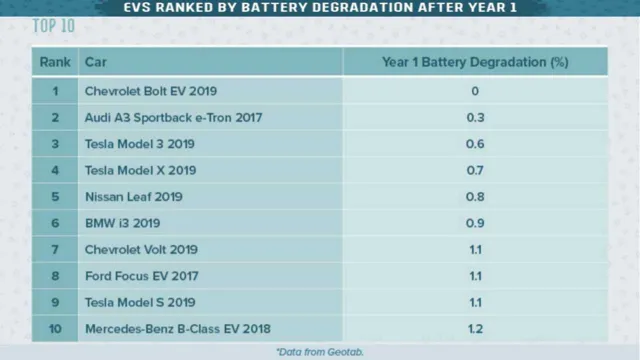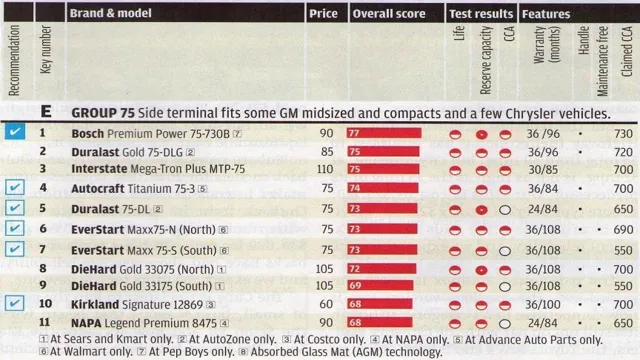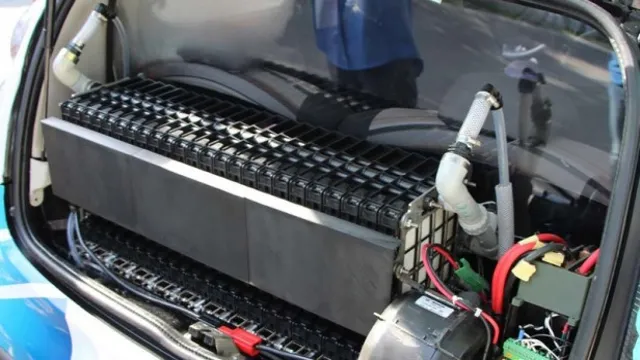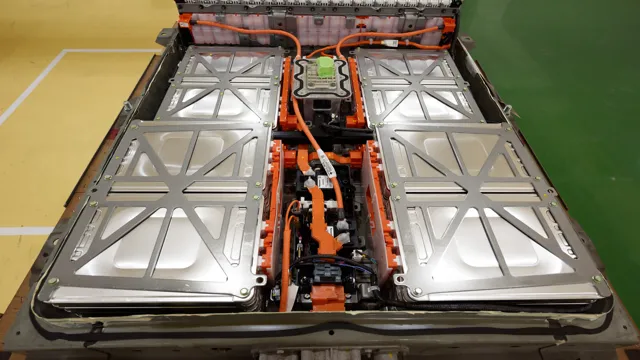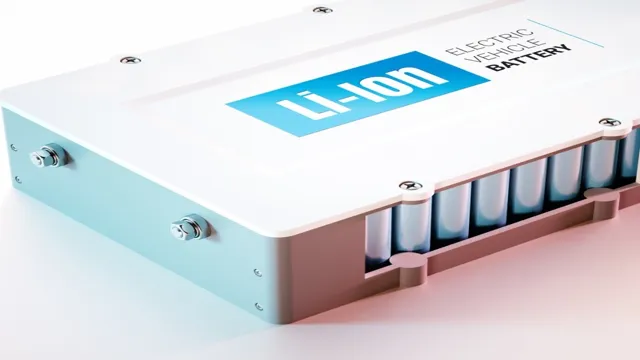Unveiling the Truth: The Real Impact of Old Electric Car Batteries on our Environment
Electric cars have become a popular choice for environmentally-conscious individuals who want to reduce their carbon footprint. However, as technology advances and batteries age, the question arises: what happens to old electric car batteries? While there is no doubt that electric cars are better for the environment than traditional gasoline-powered cars, concerns around the environmental impact of old batteries are growing. With the increasing popularity of electric vehicles, it’s important to examine the issue of old batteries and their effect on the environment.
In this blog, we will delve into the topic of electric cars, old batteries, and the environment, weighing the pros and cons of this emerging technology. Let’s explore what happens to these batteries when they are no longer used, and how we can minimize their impact on the planet.
Introduction
When it comes to electric cars, there’s a growing concern about what happens to the batteries once they have reached the end of their useful lives. This concern is entirely reasonable since batteries make up a significant portion of electric cars’ environmental impact. The manufacturing process for the batteries alone requires a lot of resources and produces a considerable amount of greenhouse emissions.
Moreover, as electric car batteries reach the end of their lifespan, it’s essential to find a way to dispose of them in a responsible and environmentally friendly manner. While some may argue that old electric car batteries are bad for the environment, the reality is that they can be recycled and repurposed to reduce waste, minimize pollution, and support renewable energy storage systems. Ultimately, it’s all about implementing sustainable practices that ensure we leave a cleaner, healthier planet for future generations.
Environmental Impact of Electric Cars
Electric cars have been hailed as the solution to pollution and the key to a greener future. However, despite their numerous benefits, they are not entirely without environmental impact. The production of electric vehicles requires large amounts of energy and resources.
The mining of rare earth metals used in their batteries is often associated with environmental degradation, deforestation, and pollution. Additionally, the disposal of used batteries also presents significant challenges as they contain hazardous materials that need to be disposed of safely. Nonetheless, the environmental impact of electric cars is significantly lower than that of traditional gasoline vehicles.
They are emissions-free, have a longer lifespan, and can be powered by renewable energy. As the world moves towards renewable energy and sustainable transportation, it is evident that electric cars have an important role to play in mitigating environmental degradation.
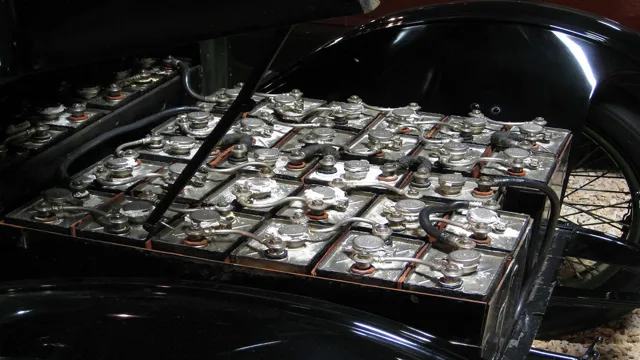
Battery Life Expectancy
Battery life expectancy is a topic that many people overlook when purchasing electronic devices. It’s understandable considering most people are more concerned with the specs of the device rather than how long the battery will last after prolonged use. However, understanding the battery life expectancy is essential as it can impact the overall performance and longevity of the device.
Battery life expectancy refers to the amount of time it takes for the battery to store and release its energy before it needs to be replaced. It varies depending on the type of battery, usage frequency, and environmental factors. Therefore, it’s important to know how to care for your battery to ensure it lasts as long as possible.
The Fate of Old Electric Car Batteries
Old electric car batteries have been a topic of concern for many individuals, with the primary question being whether they are bad for the environment. Although they may no longer be suitable for powering electric vehicles, these batteries can still be useful for a variety of purposes. Recycling is an essential component when it comes to disposing of these batteries sustainably.
The recycling process involves breaking down the battery’s components, such as the metals and plastics, and extracting the usable components. This process helps to reduce the environmental impact of these batteries since they no longer contribute to landfill waste or pollution. Additionally, some companies are exploring ways of repurposing old batteries for other uses, such as energy storage.
Overall, while old electric car batteries may not be ideal for powering vehicles, they can still be an asset for other applications and their environmentally-friendly disposal is crucial for minimizing their impact on the planet.
Recycling & Reuse Programs
Recycling old electric car batteries has become increasingly important in recent years, as the popularity of electric cars continues to rise. While these batteries can no longer efficiently power a car, they still contain valuable materials that can be reused. Unfortunately, they also contain harmful substances such as lead and acid which require special handling.
Many companies have begun developing recycling and reuse programs to prevent these batteries from ending up in landfills. One such program is repurposing old electric car batteries to store renewable energy from sources like wind and solar. This not only extends the lifespan of the batteries but also helps to reduce reliance on fossil fuels.
It’s essential to remember that even after an electric car battery is no longer able to power a car, it still has value and can be useful in a variety of ways.
Second Life Applications
As electric vehicles continue to grow in popularity, the fate of their old batteries becomes an important issue. Rather than being discarded, many of these batteries can find new life in Second Life applications. These applications include energy storage for homes and businesses, as well as power supplies for electric forklifts and other industrial equipment.
By repurposing old batteries, we can help reduce the environmental impact of electric vehicle manufacturing and disposal. Furthermore, Second Life applications provide an economic benefit by extending the useful life of these batteries, reducing the need for new ones to be manufactured. With the continued growth of electric vehicles, the importance of Second Life applications for old batteries will only increase, making it an exciting and promising field for both environmental and economic sustainability.
Disposal & Environmental Concerns
One of the biggest concerns surrounding electric vehicles is what to do with the car batteries once they reach the end of their lifespan. While electric car batteries can last up to 15-20 years, they eventually need to be replaced, leaving thousands of old batteries to be disposed of properly. Thankfully, many automakers have implemented recycling programs to safely recycle and repurpose the batteries.
Several companies are also working on developing second-life applications for the batteries, such as using them for energy storage in buildings or reusing them in other vehicles. While there is still progress to be made in ensuring the safe disposal and recycling of old electric car batteries, it is comforting to know that the industry is actively working on sustainable solutions.
Future Innovations & Improvements
Old electric car batteries can be bad for the environment if they are not properly disposed of. While electric cars are more eco-friendly than traditional gasoline-fueled cars, their batteries contain toxic chemicals that can pollute soil and water if not disposed of correctly. However, there are new and innovative ways to recycle these batteries.
Some companies are developing ways to repurpose old batteries for home energy storage systems or to power non-automotive devices. Additionally, advancements in battery technology are leading to longer-lasting and more efficient batteries, further reducing the need for disposal and easing the burden on the environment. It’s crucial to remember that all technology, whether old or new, should be recycled or disposed of responsibly to minimize negative impacts on the environment.
Advancements in Battery Technology
Advancements in battery technology have been a game-changer for countless industries, from electric vehicles to renewable energy storage. However, the future of battery innovation looks even brighter. One potential breakthrough is the use of high-energy-density lithium-sulfur batteries, which offer twice the energy density of traditional lithium-ion batteries.
Another exciting development is the use of solid-state batteries, which use a solid electrolyte instead of a liquid one, making them safer, more stable, and able to hold a charge for longer. These advancements not only increase the efficiency of batteries but also make them more accessible and affordable for consumers. It is remarkable to think that one day, we could have batteries capable of powering electric aircraft and revolutionizing the way we travel.
The possibilities are endless, and we cannot wait to see what future innovations and improvements are in store.
Sustainable Disposal Options
As the world continues to face the challenge of waste management, sustainable disposal options become increasingly important. While recycling and composting are well-known practices and have been implemented in many countries, there are still many improvements and innovations needed to take the waste disposal industry to a new level. One such innovation is the development of new materials that are biodegradable and easily decomposable, thus reducing the amount of waste that ends up in landfills.
Another promising option is the use of renewable energy sources to power waste disposal facilities, which can help reduce greenhouse gas emissions and the overall carbon footprint. Additionally, technological advancements can help improve the efficiency of waste management processes, thereby reducing costs and improving overall environmental sustainability. Despite the many challenges that lie ahead, these future innovations provide hope for a cleaner, greener future for all.
Conclusion
After considering all the facts, it’s safe to say that old electric car batteries aren’t necessarily bad for the environment – it just depends on how they’re disposed of. With proper recycling and repurposing efforts, these batteries can actually contribute to a more sustainable future. Plus, let’s not forget that electric cars themselves are a major step towards reducing our reliance on fossil fuels and combating climate change.
So next time someone questions whether electric cars are truly eco-friendly, remind them that the bigger picture is much more complex than a simple yes or no answer.”
FAQs
What happens to old electric car batteries after they are no longer usable?
Old electric car batteries go through a process called battery recycling, where materials such as cobalt, lithium, and nickel are extracted and reused. This process can reduce the environmental impact of these batteries.
Are electric cars really better for the environment than gas-powered cars?
Overall, electric cars have a smaller carbon footprint compared to gas-powered cars. However, the impact on the environment largely depends on how the electricity used to power these cars is generated.
Do electric car batteries release harmful chemicals into the air or water?
Electric car batteries do not release harmful chemicals into the air or water during normal use. However, if they are not disposed of properly, the chemicals in the batteries can leach into the environment and cause harm.
Can old electric car batteries be repurposed for other uses?
Yes, old electric car batteries can be repurposed for other uses, such as stationary energy storage for homes or businesses. This can help improve the efficiency and sustainability of the energy system.

